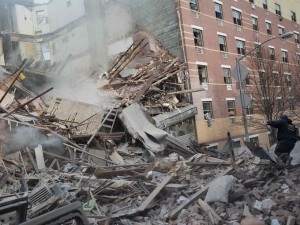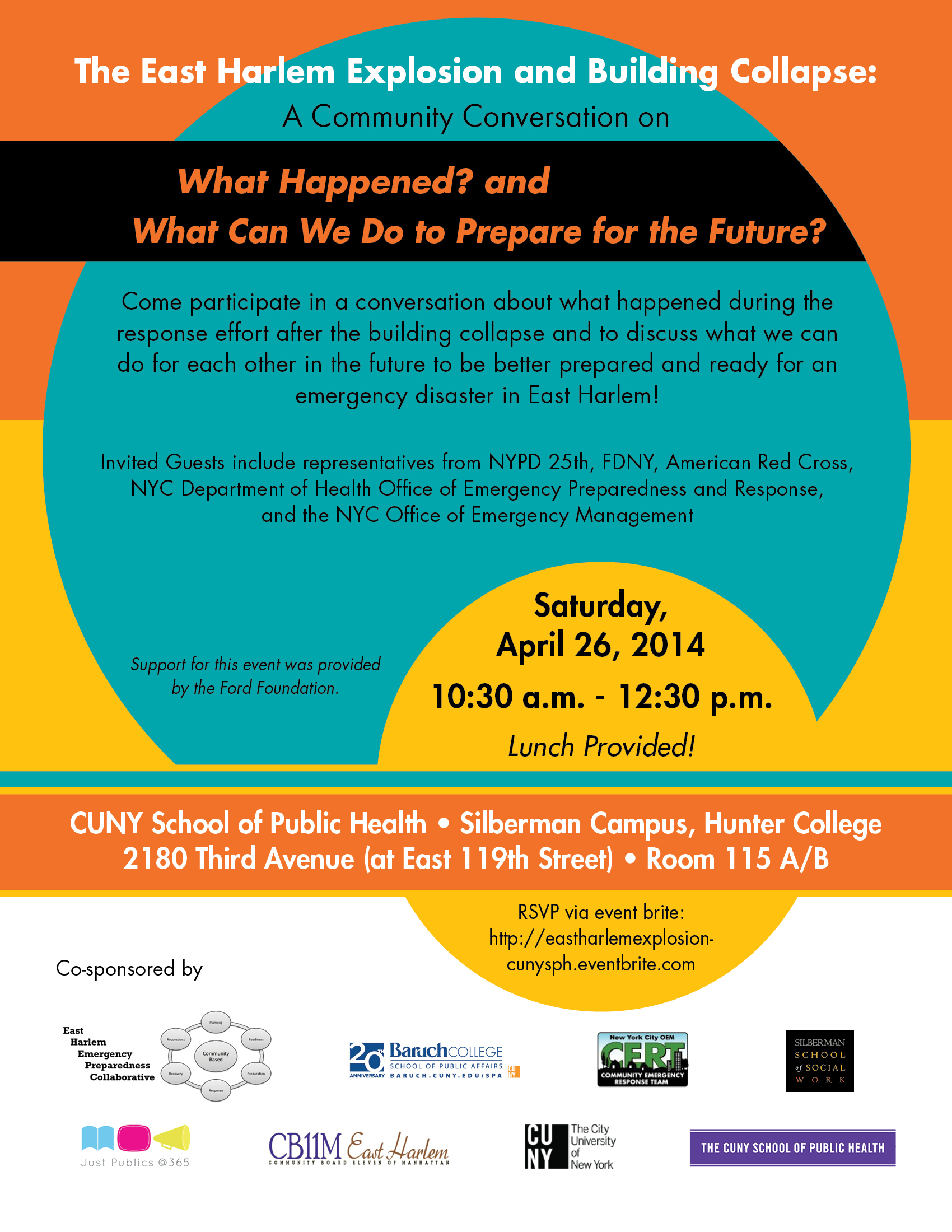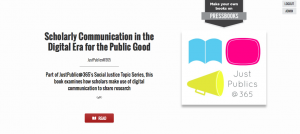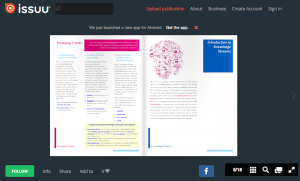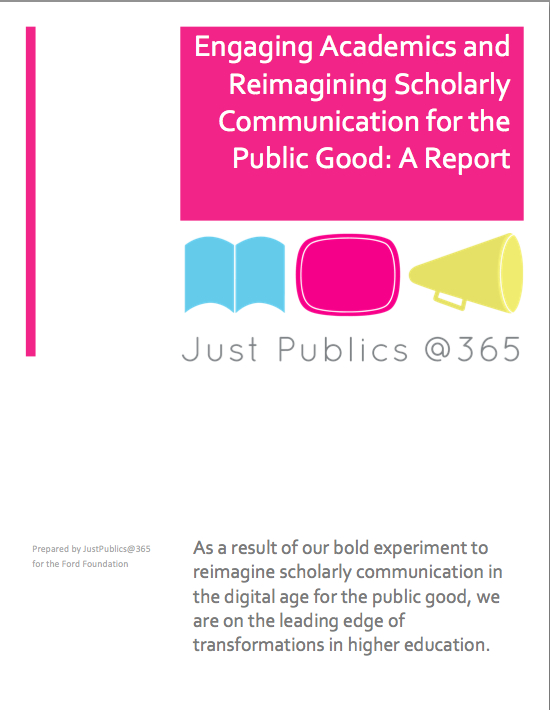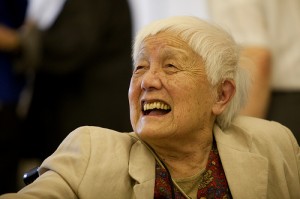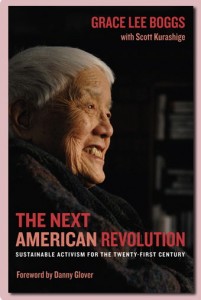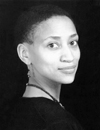 A key focus of JustPublics@365 is on the work of scholar-activists. Someone who exemplifies this model of engaged scholarship is Lynn Roberts, an Assistant Professor at the CUNY School of Public Health. Her broad range of work and research has included reproductive justice, youth development and juvenile justice, the prevention of intimate partner violence, models of community organizing for social justice; and the intersection of race, class and gender and its influence on health disparities. In this series on East Harlem, we’ll feature a number of scholar-activists.
A key focus of JustPublics@365 is on the work of scholar-activists. Someone who exemplifies this model of engaged scholarship is Lynn Roberts, an Assistant Professor at the CUNY School of Public Health. Her broad range of work and research has included reproductive justice, youth development and juvenile justice, the prevention of intimate partner violence, models of community organizing for social justice; and the intersection of race, class and gender and its influence on health disparities. In this series on East Harlem, we’ll feature a number of scholar-activists.
Lynn Roberts on Public Health and Social Justice Activism
Collette Sosnowy: Thanks for talking with me today, Lynn. Can you share a little bit about your work in East Harlem and in the South Bronx?
Lynn Roberts: I suppose my work in East Harlem began actually many years ago when I was also teaching at Hunter College, in their public health program. I developed a course about 12 years ago focused on initially the South Bronx because I have been doing some work there and expanded it to include Harlem, not just East Harlem but Central and West as well, from the perspective of people who lived and worked there, so that you could look at it through various disciplines and also through lived experiences rather than just an academic lens and then updated the course when we moved into the community here of East Harlem in Fall 2012.
That brought me back to East Harlem with fresh eyes and in a different period of time in its, I guess, evolution, depending on how you look at it because a lot of changes in the community in terms of real estate and gentrification and then our being here and being able to reach out again and form relationships with those who are doing interesting and exciting community work here.
Collette Sosnowy: What are the parallels between South Bronx and East Harlem?
Lynn Roberts: They’re each very rich communities and one of the things that I think was highlighted in the course was just the diversity. I choose the South Bronx and Harlem because they both represented what I think are perceived by the general public as iconic communities.
People hear the South Bronx, they hear Harlem, and they might have a preconceived notion about what each one of those communities represent if they haven’t been there or lived there. I wanted to demystify and clarify the richness of each of these communities, not just as whatever someone’s preconceived notion of what might be described as a low income or an urban community is like. They each have rich histories of growth and decline of innovation in terms of the arts and just really rich histories in terms of the larger American story.
I think it’s important for all of us to know about these communities from those who know best and bringing the community into the classroom I think is really important. A large part of wanting to revisit the course was to, I guess, dispel some of the myth and even some of the apprehension and fear of that, some of my fellow colleagues and students had about being in East Harlem in particular, fear of crime, fear of some type of danger, which I didn’t experience and I didn’t think was any different than other parts of New York City.
I thought if they knew more about the community, that would widen their lens of working in any community and approach any community with eyes wide open and with ears more attentive to hearing from those community voices.
Collette Sosnowy: How is health a social justice issue?
Lynn Roberts: Very much so. I think that social justice is necessary for health. When you have social justice you have health and wellness, all the positive attributes we associate with that. You have clean air. You have clean water. You have equity in terms of resources such as education and employment. You have a diversity of ideas and background. You have democracy. You have people who get to decide what will happen in their community, in their society, in their country and that is fundamentally good in terms of these peoples’ overall well-being but also just how they also feel about themselves and how much they feel willing to participate civically and have raised expectations for themselves, for their families, for their entire communities. I think they’re intertwined. I think they’re one in the same. I don’t think you can have one without the other.
Collette Sosnowy: As you were talking about before, some academics are hesitant to get involved in controversial issues like those confronting East Harlem. What do you say to critics who might question your “objectivity” as a scholar?
Lynn Roberts: First of all, I probably identify first as an activist and second, or simultaneously, as a scholar. They’re both a part of who I am. I don’t think scientists or scholars really can practice objectivity. I think all questions are based on our lived experiences, our exposures. What we consider valid depends on that. We’re all subjective in terms of how we pursue knowledge and what knowledge we consider important.
That’s not a quest of mine. I’m probably more inclined to just disclose what my subjectivities are, whatever my biases are as I know them. Not all of them are known to me but being more accepting of that, I’m much more inclined to be accepting of that in others. I’m much more inclined to engage with others in a way that I think, maybe it’s an objective but is open. If I’m open I can probably look at things and consider another point of view in a way that makes me more accessible and makes others with whom I interact more accessible to sharing.
I see it as an advantage in terms of my scholarship. How that plays out on the academy depends on, again, someone else’s perspective on that, so that can be a challenge.
Collette Sosnowy: A major focus of JustPublics@365 is bringing together academics and activists and journalists in ways that promote social justice through civic engagement and greater democracy. What sort of “lessons learned” do you have from your experience as an academic-activist in going into some of these fields that are usually more in the area of activism and journalism?
Lynn Roberts: First and foremost I go as a listener but that doesn’t mean that I don’t also bring who I am and my own point of view. It means sometimes hearing first and then hoping that we all come to some conclusions where I’m also listened to. I know that as an academic, in some instances, my voice might be given more credence than someone else’s, so needing to balance that and have some humility around that is really important.
Then using my voice may be perceived a greater agency or power, if you will. Effectively but again, in collaboration, not in speaking for or instead of others. I can contribute to in ways that others might not but I don’t really distinguish doing that in or outside of the academy. I really don’t. I think a lot of those lines are rather artificial.
There’s a lot of wisdom everywhere. There’s expertise everywhere and it’s just realizing that and when you approach it that way you tend to get a lot more done and people, once you dispel that notion of difference, I just find it’s just really easy to work with people.

